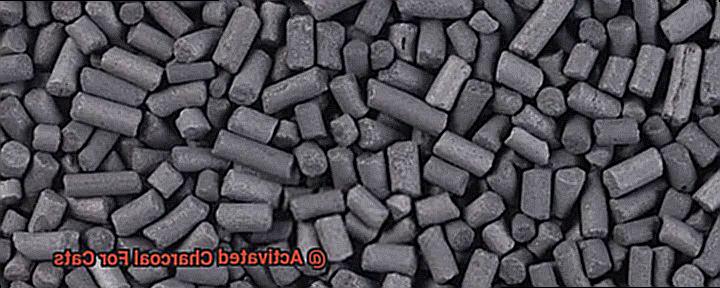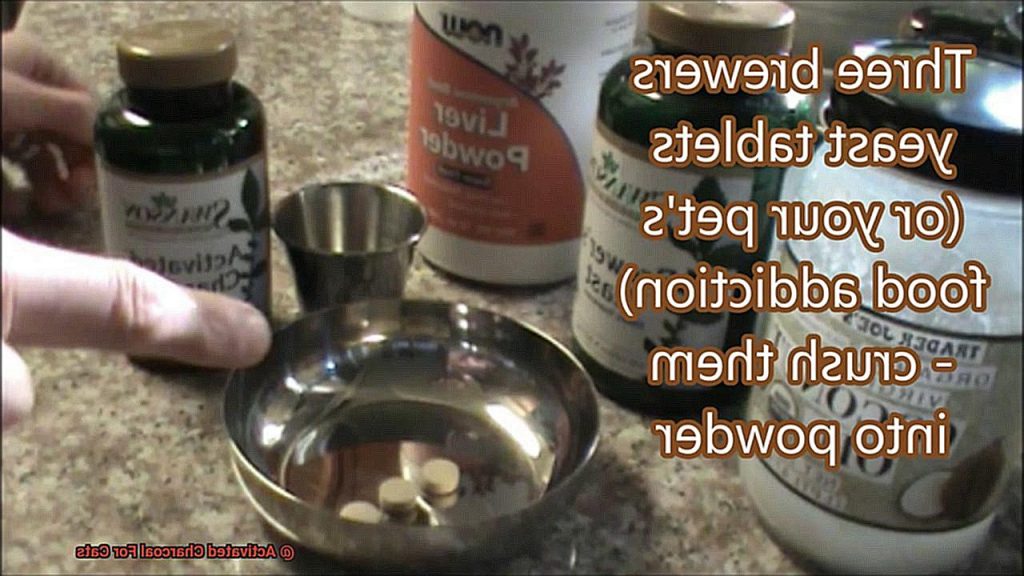We all know how curious and playful our kitties can be. But did you know that activated charcoal is not just for humans?
That’s right, this natural substance has been making waves in the pet world for its amazing benefits for our furry companions. From detoxifying their bodies to improving their digestion, activated charcoal is a game-changer for cat health.
Trust me, you won’t want to miss this purr-fectly informative blog post.
Activated Charcoal For Cats?
Contents
As cat owners, we all want to ensure the health and well-being of our feline companions. And when it comes to keeping them healthy, we often turn to natural remedies. One such remedy that has gained popularity in recent years is activated charcoal. But what exactly is activated charcoal, and how can it benefit our cats? Let’s dive into the world of activated charcoal and its potential benefits for our furry friends.
What is Activated Charcoal?
Activated charcoal is a form of carbon that has been treated with oxygen, making it highly porous and able to adsorb toxins and chemicals. Unlike absorption, where substances are soaked up by a material, adsorption involves molecules adhering to the surface of the material. This makes activated charcoal an effective detoxifier as it traps harmful substances and prevents them from being absorbed by the body.
How Can Activated Charcoal Benefit Cats?
Detoxification
Just like humans, cats can come into contact with various toxins in their environment. These toxins can be found in plants, household products, or even certain foods. Ingestion of these toxins can lead to gastrointestinal upset, vomiting, and even more serious health issues. Activated charcoal can help by binding to these toxins and preventing them from causing harm to your cat’s body.
Gastrointestinal Issues
Activated charcoal can also be useful in cases of food poisoning or bacterial infections in cats. It can help absorb the toxins produced by bacteria in the digestive tract, reducing symptoms like diarrhea and abdominal pain. This is especially helpful for cats who have sensitive stomachs or are prone to gastrointestinal issues.
Flatulence Relief
Just like humans, cats can experience gas build-up in their digestive system. This can cause discomfort and bloating for our furry friends. Activated charcoal can help by absorbing excess gas and reducing bloating in cats. So next time you hear your cat letting out loud toots, consider giving them activated charcoal to ease their discomfort.
Bad Breath
No one likes bad breath, not even our cats. Activated charcoal can also help with this issue by binding to the compounds responsible for the foul odor. So it not only benefits your cat’s health, but it can also improve their breath.
How Does Activated Charcoal Work in Cats’ Bodies?
That’s why it’s important to stay informed about different ways to keep them healthy and happy. One substance that has gained popularity in recent years for its detoxifying properties is activated charcoal. But how does it work in a cat’s body? Let’s find out.
What is Activated Charcoal?
Activated charcoal is a form of carbon that has been treated with oxygen to make it more absorbent. It has a high number of pores, giving it a large surface area for trapping toxins and chemicals. This makes it an effective tool for removing harmful substances from the body.
How Does it Work in Cats’ Bodies?
When ingested, activated charcoal works by binding to toxins and chemicals in the digestive tract, preventing them from being absorbed into the bloodstream. It acts like a magnet, trapping the toxins in its pores and then carrying them out of the body through feces.
Why is it Beneficial for Cats?
Activated charcoal can be beneficial for cats in various ways. It is commonly used as a treatment for poisoning as it can quickly remove toxins from the body. It can also help with digestive issues such as diarrhea or gas by absorbing excess gas and toxins in the digestive tract.
Is it Safe for Cats?
Yes, activated charcoal is safe for cats to ingest as it is not absorbed by the body. However, it can interfere with the absorption of medications and other supplements, so it’s crucial to consult with your veterinarian before giving it to your cat.
Can it Help with Kidney Disease?
Some experts believe that activated charcoal can aid in managing kidney disease in cats. By binding to excess urea and other waste products in the body, it may reduce the workload on the kidneys. However, this should only be used under the guidance of a veterinarian.

Choosing the Right Product
When using activated charcoal for cats, it’s important to choose a high-quality product specifically formulated for pets. Human-grade activated charcoal may contain additives or chemicals that could be harmful to cats.
How to Give it to Your Cat
The recommended dose of activated charcoal for cats is 1 gram per pound of body weight. It can be administered as a powder mixed with water or as a capsule hidden in food. It’s best to give it on an empty stomach, at least 2 hours before or after meals.
The Benefits of Using Activated Charcoal for Cats
As a loving cat owner, you want nothing but the best for your feline companion. So when it comes to their health and well-being, it’s important to explore natural and safe remedies. One such solution that has gained popularity in recent years is activated charcoal. Known for its detoxifying properties in humans, this powerful substance also has numerous benefits for our furry friends. In this post, we’ll delve into the potential advantages of using activated charcoal for cats based on research and expert knowledge.
Detoxifies the Body
Just like us, cats can be exposed to harmful toxins and chemicals in their environment. Whether it’s from accidentally ingesting toxic substances or certain medications, these toxins can have serious consequences on their health. This is where activated charcoal comes in – with its magnet-like properties, it binds to these toxins and prevents them from being absorbed into their bloodstream. This not only helps in emergency situations but also promotes long-term health by reducing the risk of organ damage caused by exposure to toxins.
Combats Bacterial Infections
In addition to its detoxifying abilities, activated charcoal also has antibacterial properties that can help fight against bacterial infections in cats. By preventing the growth and spread of harmful bacteria in their digestive tract, it can be beneficial for cats with gastrointestinal issues or those prone to infections.
Relieves Symptoms of Food Allergies
If your cat suffers from food allergies or sensitivities, you know how uncomfortable and distressing it can be for them. Activated charcoal can help alleviate these symptoms by binding to allergens in their digestive system, reducing inflammation and discomfort. This natural solution can provide relief without the use of harsh medications.
Aids in Digestive Issues
Activated charcoal can also be used to treat cases of diarrhea in cats. Its absorbent properties help bind excess water and toxins in the digestive tract, leading to firmer stools and reducing dehydration. It’s a safe and effective solution that can provide relief for your cat’s tummy troubles.
Enhances Overall Health and Well-being
Many pet owners have reported that using activated charcoal as a dietary supplement for their cats has improved their overall health and well-being. This could be due to its detoxifying effects, as well as its ability to support a healthy digestive system. A healthy gut is essential for a strong immune system and optimal health in cats.
Safety Precautions When Using Activated Charcoal for Cats
When it comes to their health, it’s natural to turn to natural remedies like activated charcoal. This trendy ingredient has gained popularity in recent years for its detoxifying and healing properties. However, as with any supplement or treatment, it’s essential to consult with a veterinarian and follow recommended dosage guidelines when using activated charcoal for cats.
Consulting with a Veterinarian – Why It’s Important
While activated charcoal is generally safe for cats, it’s crucial to consult with a veterinarian before administering it to your pet. This is especially true if your cat has any pre-existing health conditions or is taking other medications. Activated charcoal can potentially interact with certain drugs and interfere with their absorption, making it vital to get professional advice before using it.
Dosage Guidelines – How Much is Too Much?
When using activated charcoal for cats, it’s essential to always follow the recommended dosage guidelines. Giving too much activated charcoal can have negative effects on your cat’s health, such as constipation or dehydration. It’s crucial to know the appropriate amount to give based on your cat’s weight and condition. If you are unsure about the dosage, it’s best to consult with a veterinarian for guidance.
Administering Activated Charcoal – Tips and Tricks
Administering activated charcoal to cats may not be the easiest task, but there are some tips and tricks that can make the process smoother. Here are some suggestions:
- Use a syringe: This allows for more precise dosing and easier administration.
- Mix with wet food: If your cat is a picky eater, you can mix the activated charcoal powder with their wet food.
- Dilute with water: Mix the powder with water and use a syringe to administer it directly into your cat’s mouth.
- Use a pill pocket: If your cat is taking activated charcoal in pill form, you can use a pill pocket or wrap it in a treat to make it more appealing.
Using Activated Charcoal to Treat Gastrointestinal Issues in Cats
As cat owners, it can be heartbreaking to see our furry friends suffering from gastrointestinal issues. Whether it’s a mild case of stomach upset or a more serious condition like food poisoning, we want to do everything we can to help them feel better. That’s where activated charcoal comes in – a natural remedy that can be highly effective in treating certain gastrointestinal problems in cats. As a self-proclaimed expert on using activated charcoal for cats, I’m here to provide you with a comprehensive guide on the proper usage and dosage of this treatment.
What is Activated Charcoal and How Does it Work?
Activated charcoal is a form of carbon that has been treated with oxygen to make it highly absorbent. It works by binding to toxins and chemicals in the digestive tract, preventing them from being absorbed into the body. This makes it an ideal treatment for gastrointestinal issues caused by ingesting toxic substances or chemicals.
Dosage Guidelines for Cats
While activated charcoal can be a lifesaver for cats suffering from certain gastrointestinal issues, it’s important to follow proper dosage guidelines. Too much activated charcoal can actually cause constipation and blockage in the intestines. The recommended dosage for cats is 1 gram per kilogram of body weight, but it is always best to consult with your veterinarian before administering any treatment.
When to Use Activated Charcoal
Activated charcoal may be most effective for treating gastrointestinal issues caused by ingesting toxins or chemicals. It may not be as effective for other causes such as bacterial infections or dietary intolerances. Some common signs of gastrointestinal issues in cats include vomiting, diarrhea, loss of appetite, and lethargy. If your cat is experiencing these symptoms, it is important to monitor them closely and seek veterinary care if necessary.
Preventative Use of Activated Charcoal
In addition to its use in treating gastrointestinal issues, activated charcoal can also be used preventatively if you suspect your cat may have ingested something toxic or harmful. However, it is still important to consult with a veterinarian before administering any treatment. Activated charcoal should never be used as a first-line treatment for any medical condition without professional guidance.
Potential Side Effects and Risks of Using Activated Charcoal for Cats
As cat owners, we always want to ensure that our furry friends are happy and healthy. That’s why when it comes to treating common health issues like gastrointestinal problems, we often turn to natural remedies. One such remedy that has gained popularity in recent years is activated charcoal. But before you start incorporating this treatment into your cat’s care routine, it’s important to understand the potential side effects and risks associated with it.
Risk of Aspiration
One of the main concerns with using activated charcoal for cats is the risk of aspiration. This occurs when the cat inhales the charcoal powder, causing it to enter their lungs instead of their digestive system. This can lead to serious respiratory issues and even pneumonia. To avoid this, it’s essential to administer activated charcoal carefully and under the guidance of a veterinarian.
Interference with Essential Nutrients and Medications
Activated charcoal has a strong ability to bind to substances, which can include vitamins, minerals, and medications. While this can be beneficial in removing toxins from the body, it can also interfere with the absorption of essential nutrients and medications. If your cat is given activated charcoal too close to taking medication or consuming essential nutrients, it can reduce their effectiveness.
Gastrointestinal Discomfort
Some cats may experience gastrointestinal discomfort after consuming activated charcoal. This can manifest as nausea, vomiting, or diarrhea – all unpleasant symptoms for both you and your cat. This is more common in cats with sensitive stomachs or those who have ingested a large amount of activated charcoal. If you notice any signs of discomfort in your cat after using activated charcoal, consult with your veterinarian.
Allergic Reactions
In rare cases, cats may also have an allergic reaction to activated charcoal. Symptoms can include difficulty breathing, swelling of the face or tongue, hives, and collapse. If your cat shows any signs of an allergic reaction, seek immediate veterinary care.
Importance of Proper Dosage and Consulting with a Veterinarian
It is crucial to use activated charcoal for cats only as directed by a veterinarian. Giving your cat too much or using it for extended periods can lead to imbalances in their electrolytes and dehydration. It’s also important to note that not all forms of activated charcoal are safe for cats. Some products may contain additives or flavorings that could be harmful to them. Always check with your veterinarian before giving your cat any type of activated charcoal product.
Administering Activated Charcoal to Your Cat: Proper Dosing and Methods
That’s why many of us turn to natural remedies like activated charcoal to treat common issues such as poisoning, digestive problems, and even bad breath. But before you rush to add this black powder to your cat’s food or water, it’s important to understand the proper dosing and administration techniques to ensure its effectiveness and safety.
Consult with Your Veterinarian First
While activated charcoal may seem like a harmless solution, it’s always best to consult with your veterinarian before administering it to your cat. They can advise you on the appropriate dosage based on your cat’s weight, age, and medical history. They can also recommend the best method of administration, as well as any precautions or potential risks to look out for.
Dosing and Administration Tips
The recommended dose of activated charcoal for cats is 0.5 to 1 gram per pound of body weight. However, this can vary depending on the severity of the issue and the concentration of activated charcoal used. It’s important to start with a lower dose and gradually increase if needed.
Activated charcoal can be given to cats in various forms such as powder, liquid, or capsules. While mixing it into wet food or water is the most common method, some cats may refuse to consume it this way. In that case, capsules may be a better option. Just make sure not to mix activated charcoal with milk or dairy products, as it can reduce its effectiveness.
Timing is Everything
To ensure activated charcoal works effectively, wait at least an hour before or after giving any other medication or supplements to your cat. This will prevent any interference with absorption and allow the activated charcoal to do its job properly.
In cases of emergency poisoning, your veterinarian may recommend administering activated charcoal through a feeding tube or by gastric lavage. These methods ensure that the charcoal reaches the stomach quickly and effectively absorbs any harmful substances.
Monitor Water Intake and Follow Up
As activated charcoal has absorbent properties, it’s crucial to monitor your cat’s water intake and hydration levels while using it. If your cat shows signs of dehydration, such as dry mouth, lethargy, or decreased urination, contact your veterinarian immediately.
Conclusion
In summary, activated charcoal is not just reserved for humans – it can also be a game-changing remedy for our beloved feline friends. This seemingly simple black powder has been making waves in the pet world for its natural detoxifying properties and ability to improve digestion. As a proud cat owner, you won’t want to miss out on incorporating activated charcoal into your furry companion’s care routine.
However, it’s crucial to consult with your veterinarian before administering activated charcoal to your cat. They will be able to provide proper dosage guidelines and ensure its effectiveness and safety for your specific cat. It’s also important to closely monitor your cat while using activated charcoal, paying attention to their water intake and any potential side effects.
While activated charcoal may have numerous benefits for cats, it’s always best to use it under the guidance of a professional. Its detoxifying abilities and support for gut health can help keep our furry friends happy and thriving.






